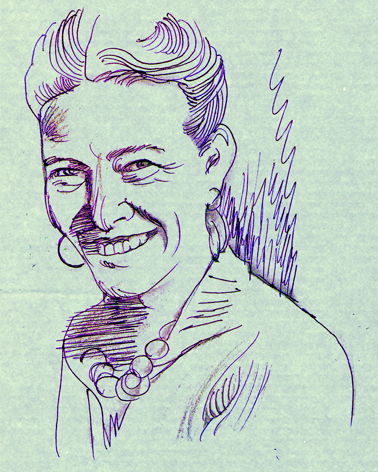In 2016, two books were published by conservative women intellectuals seeking to settle scores with what those on the right pejoratively call ‘neofeminism,’ and with the movement’s ostensible patron saint, Simone de Beauvoir. One of the books, Adieu Simone! Les dernières heures du féminisme (Goodbye, Simone! Feminism’s Final Hours), was written by the journalist Gabrielle Cluzel, a contributor to the conservative website Boulevard Voltaire. The other, entitled Goodbye, Mademoiselle: The Defeat of Women, was written by Eugénie Bastié, a twenty-five-year-old journalist at Le Figaro.
Both titles can be seen to embody the ideas of conservative women intellectuals regarding Simone de Beauvoir — her moment, they feel, has decisively passed. But this was not how Éric Zemmour interpreted Bastié’s work when he reviewed his colleague’s book in Le Figaro Vox in April 2016. His article was entitled ‘We Must Say Goodbye to Simone de Beauvoir’ (2016). As much as he admired Bastié’s daring, Zemmour argued that she had not yet been able to break loose from Beauvoir. In his view, all the disasters caused by ‘neofeminism’ are present in Beauvoir, not just in The Second Sex but throughout her work.
It was Beauvoir who wrote that ‘one is not born, but rather becomes, woman’ and, less famously, that ‘I dreamed of being my own cause and my own end’ — both of which, he argues, provide a foundation for ‘Judith Butler’s gender theory and other queer theories.’ But this is an argument that he lifts, without acknowledgment, from Bastié herself. In this sense, he is wrong to think that there is a theoretical line of descent between the two intellectuals. Zemmour’s interpretation may be explained by Bastié’s claim, at the start of her book, that she intends to rescue Beauvoir — Beauvoir the woman and the intellectual, that is, rather than Beauvoir the feminist. Bastié goes on to adopt the label of ‘feminist,’ but continues to criticize Beauvoir even while using her — as a feminist, among other things — in the defense of what she calls an ‘integral feminism,’ which she undertakes alongside the philosopher Marianne Durano. It is this apparent ambiguity that I focus on here.
My hypothesis is that Beauvoir constitutes an issue around which these authors position themselves within debates about gender and feminism, which have always interested conservatives. In other words, these conservative women intellectuals must take up a position in relation to Beauvoir, the patron saint of feminism. On the one hand, Beauvoir is recognized, even lauded, as a woman and an intellectual; on the other, she is violently rejected as a feminist and, at the same time, is used as such by conservative women intellectuals.
How is this possible? What do such positions reveal about these women’s claims to feminism? To answer these questions, I undertake a close reading of the two main works by Bastié and Durano, which I compare with other texts: interviews that the two have given and theoretical and political texts that they have co-authored. I begin by examining these authors’ rejection of Beauvoir’s feminism. I then look at the ways in which they defend her thought and claim that she represents an emancipatory figure. Finally, I discuss how the position of these women conservatives — who oscillate between rejecting Beauvoir and endorsing and appropriating her — is part of the feminist discursive strategy of these antifeminists.
Rejecting Beauvoir’s feminism
It is, first of all, Beauvoir’s feminism which Bastié and Durano reject. To understand this, we turn to another author, Natacha Polony — although also young, she belongs to a different generation than the recent, particularly aggressive crop of women conservatives. Like them, Polony distinguished herself early on in debates about issues of gender and feminism. A journalist and an essayist, in 2007 Polony published a book whose title thumbed its nose at feminists and sought to promote her own particular conception of universalism: L’Homme est l’avenir de la femme (Man is the Future of Woman).
In the book, Polony argues that Beauvoirian approaches have become outdated. She describes The Second Sex as a study of ‘a type of human being that has now disappeared’, given that a sociological change has taken place between the time when Beauvoir was writing and the present, rendering her portrait of the female condition obsolete. Bastié’s Adieu Mademoiselle was published nine years later while its author, like Polony, was a journalist at Le Figaro. Bastié begins by attacking Beauvoir:
‘Unlike racial divisions, the difference between the sexes is a settled fact and, unlike social divisions, it constitutes a stable, unalterable truth, one intrinsically connected to the human condition. By starting a war of division not between communities or classes but in the home itself, Beauvoir attacks the core of historical humanity, which was to become the battlefield for an eternal war between the sexes.’
Note, first of all, the virulence of these remarks. According to Bastié, a substantial crime has been committed. She argues that Beauvoir’s feminist thought has created an unresolvable — an ‘eternal’ — conflict between men and women, by denying what she presents as an anthropological invariant, as the only ‘settled fact’ in the matter: the difference between the sexes.
What she calls ‘historical humanity’ refers to a positive vision of this difference: a fruitful complementarity between the sexes, embodied in the heterosexual couple, the cornerstone of the family, supposedly shattered by the vast project of deconstruction that Beauvoir’s feminism initiated. Bastié thus criticizes the indifferentiation of the sexes, which, according to conservatives, has been promoted by proponents of gender theory. As she puts it a little later:
‘“I dreamed of being my own cause and my own end,” Simone de Beauvoir [wrote] in her memoirs. Gender theory is just the final, most radical version of this assumption of indeterminacy. Butler simply takes up and pushes forward the claim. ‘One is not born, but rather becomes, woman,’ says Beauvoir. And Butler adds: “Why become one?”’
Bastié presents a more radical version of this argument in an interview published online by the ‘antimodern’ journal, Philitt:
‘I think [. . .] that all of this feminist lunacy was present, embryonically, in The Second Sex. Simone wrote that “one is not born, but rather becomes, woman,” and the Wahhabi-feminists who came after her have taken her orders literally, and have radicalized them: Why become one?’
While Bastié is at first exclusively critical of feminism, her position on issues of difference between the sexes opens the way for her to claim a form of differentialist feminism — part of a strategy of misappropriation that, throughout history, has often been employed in antifeminism. A shift thus occurs: Bastié’s subsequent, and predictable, adoption of the ‘feminist’ label exists alongside her attack on what conservatives pejoratively call ‘neofeminism.’
With her colleague, the philosopher Marianne Durano, Bastié has conceptualized what they call ‘integral feminism.’ They present it as being both environmentalist and anticapitalist, and its ideas were laid out in the form of a manifesto published in a journal to which they both belong.
The attacks on Beauvoir changed substantially following Durano and Bastié’s claim to feminism. Whereas in the past Bastié had simply described The Second Sex in passing as ‘a ghastly description of the female condition’, she now argues that Beauvoir’s feminism is alienated from the practical lives of women and regards their bodies with contempt. By contrast, ‘integral feminists’ call for a return to the body and its specificity.
The claim that Beauvoir negates the female body is repeated and expanded in Durano’s next book.
Durano turns to Beauvoir at the end of the book, in a sub-section entitled ‘The “Modern” Woman Accepts Masculine Values.’ Interestingly, this is a quotation from The Second Sex, but one that has been taken out of context: Durano aims to denounce such acceptance as a denial of feminine specificity, whereas Beauvoir uses it to emphasize that women possess the same capacity for thought, action, work, and creation as males.
Over a few aggressive pages, Durano argues that Beauvoir completely misunderstood women’s carnal reality, making her incapable of proposing any serious solutions to the problems women face. To show this, she describes Beauvoir’s account of pregnancy and motherhood, female experiences that are associated with ‘facticity’ and death:
‘Wherever life is in the process of being made — germination and fermentation — it provokes disgust because it is being made only when it is being unmade; the viscous glandular embryo opens the cycle that ends in the rotting of death.’
In any case, ‘Beauvoir’s disgust’ is related to a (non)experience:
‘Beauvoir’s disgust is unfettered when it comes to her description of pregnancy and motherhood, experiences that she judges without having undergone them.’
Note that Durano uses an argument based on the authority of experience to reject Beauvoir. Implicitly, she uses her own experience to provide a contrast with Beauvoir’s: her own situation as a mother provides both a starting point and a framework for her book, and she tacitly uses it to reproach Beauvoir, who never had children.
Durano argues that the constant oppositions in Beauvoir’s work between ‘on the one hand, immanence, the body, and femininity, and, on the other, transcendence, the mind, and masculinity … show that she never went through the trial of childbirth, an experience of transcendence that takes place in the flesh itself.’ Given that the second volume of The Second Sex is subtitled ‘Lived Experience,’ and that Beauvoir pays close attention to first-hand accounts by women, presenting these in all their diversity, this charge is clearly a serious one.
Beauvoir is portrayed as the figurehead of those feminist battles that currently predominate, and to which Durano is hostile: ‘With such a legacy, it makes sense that contraception and abortion have become the only rallying cries of female emancipation’.

The figurehead. Portrait of Simone de Beauvoir, photo by Thierry Ehrmann on Flickr.
For Durano, this negative conception of the specificity of the female body ultimately reveals Beauvoir’s inability to conceive of a properly feminine freedom: ‘Beauvoir never conceives of an authentically feminine freedom, one that does not force women to deny their bodies or abandon motherhood’. In this sense, Durano opposes Beauvoir’s feminism because its universalism does not allow women to emancipate themselves except as abstract subjects — that is, in emulation of the masculine model, divorced from their specific reality:
‘The only emancipation Beauvoir proposes is abstraction … To push aside this body which weighs us down, which prevents us from devoting ourselves entirely to our work, a work of dominating the world using the mind, a mind that is neutral — i.e., masculine.
While she does not directly express it, a classical opposition between creation and procreation runs through Durano’s thought. She attacks Beauvoir for presenting ‘male pregnancy’ as the only prospect that a young woman might find desirable. This expression refers to the novelist Colette, who described experiencing the onset of labor while she was writing at her desk. Durano writes acerbically, even attacking Beauvoir for her phallocentrism:
‘Ultimately, the only pregnancy Beauvoir values is that of the novelist Colette, who tells us that she took the time to finish her sentence before giving birth: “a man’s pregnancy,” as Beauvoir cynically remarks. If we are to avoid experiencing pregnancy as a repulsive tragedy, we have to experience it as a male, or a beast. What an intellectual tour de force! That’s how far the phallocentrism goes! Man is to be the model even for the one experience unavailable to him, the only thing in which woman is clearly superior… And who is this man who is to give women lessons in pregnancy? The writer who calmly finishes their sentence before giving birth, delivering their child like one might put a comma on a page. It is as though childless Beauvoir never fully got over the fact of not having been born a Sartre.’
Yet this is not a balanced reading of Beauvoir. What Durano presents as a ‘cynical’ reproduction was in fact, as Beauvoir writes, a remark by one of Colette’s friends. Furthermore, the remark reflects the possibility of a feminine self-realization that is concomitant with the experience of motherhood, rather than just negating it.
What Durano is trying to present us with is a phallocentric Beauvoir. It is hard to imagine a more radical rejection of the philosopher, but Durano goes further, describing Beauvoir’s dichotomy between immanence and transcendence, which runs through her work, as the reflection of a ‘misogynistic dualism.’
Durano uses the argument of experience to do so. The argument is built on a philosophical opposition between phenomenology and existentialism, involving differentiated visions of the female subject — a specific subject who differs from man, versus a universal subject of equal dignity. More generally, then, the argument is driven by a differentiated anthropology of the sexes in general, and an ontologized vision of femininity in particular.
Therefore, intellectuals like Durano and Bastié reject Beauvoir as a feminist intellectual and philosopher because they believe she represents a feminism that ultimately denies women, based on what these authors conceive of and promote as women’s specific, carnal reality. However, as we will see, they do not just use Beauvoir as a foil for their own positions; in a sense, they also lay claim to her.
Laying claim to Beauvoir and her thought
Polony didn’t just write that The Second Sex deals with a ‘human being that has now disappeared’ but that it was ‘the finest analysis in existence’ of that being. In a sense, then, she endorses Beauvoir. Durano and Bastié do the same. As Durano writes, her vocation for philosophy came from reading Memoirs of a Dutiful Daughter. ‘Memoirs of a Dutiful Daughter turned my life upside down: it was because of Simone de Beauvoir that I devoted myself to philosophy’. In Adieu Mademoiselle, Bastié praises Beauvoir’s independence:
What is so striking in all of Simone de Beauvoir’s work is her stubborn refusal of the moral facticity of the bourgeois order, her unquenchable thirst for freedom … In reading the work of le Castor, I witnessed human genius attempting to take hold of history, to turn over the tables, and to break free from all the presuppositions of her age.
Such passages seem to reflect Bastié’s admiration for Beauvoir as a free, intellectual woman, existing alongside — and maybe taking precedence over — her dismissal of Beauvoir as a feminist. Bastié’s admiration extends to ‘all of Simone de Beauvoir’s work,’ implicitly including The Second Sex — in spite of her earlier assessment of the book. She even describes Beauvoir’s genius as ‘human’— rather than merely ‘female’ —, in contrast with Bastié’s typical emphasis on feminine specificity. Bastié even argues for an opposition between Beauvoir and those who lay claim to her legacy. She suggests, for instance, that Beauvoir’s legacy does not lie in the puritanical outrage of her supposed heirs:
What would she say today if she witnessed her heirs trying to ban the exhibition of the Times Square kiss statue [Unconditional Surrender] in Caen, claiming that the sculpture represents ‘sexual assault’? Or if she encountered proposals to censure The Bolt by Fragonard because the painting supposedly endorses rape?
These remarks occur early in Adieu Mademoiselle, in an introductory subsection entitled ‘Beauvoir’s laughter,’ which comes after Bastié’s claim that The Second Sex lies at the origin of all the problems caused by ‘neofeminism.’ Bastié claims that Beauvoir would have laughed at all of this — seeing her ‘trajectory’ as a ‘free woman’ ‘illuminated by the dim light of statistics,’ as her ‘epigones pull out calculators to painstakingly count the progress of equality’ (ibid., 18). In opposition to this, Bastié aligns herself with Beauvoir, whose ‘raw material was literature.’ She concludes: ‘I hear Beauvoir’s laughter, and it is to her that I dedicate these pages’.

Beauvoir’s laughter. Illustration by aenastudio via Flickr.
Such provocations undoubtedly contain a measure of recognition of Beauvoir as a philosopher and a writer. This acknowledgement is perhaps necessary for a young woman trying to present herself as an intellectual: whatever position a female subject, claiming to exist as a subject of thought, takes toward her own femininity, whether she accepts or rejects it, she must confront it — for the expression ‘woman intellectual’ has, historically, been a contradiction in terms.
In this sense, by highlighting Beauvoir’s work, and particularly her memoirs, Bastié and Durano identify a form of shared experience among these women. While Durano frequently claims to have been ‘raised’ on Marx, Beauvoir, and Foucault, her use of Beauvoir may also reflect the fascination that conservative and reactionary intellectuals often feel toward left-wing thinkers.
These intellectuals are probably not completely insincere in claiming to value Beauvoir. However, from a feminist point of view, the ambiguous way in which they refer to her illustrates the strategic dimension at work in their use of her, and, further, the methods currently available to antifeminism to make itself heard.
Antifeminists’ feminist discursive strategy
I want to come back to Polony’s remark that The Second Sex offers ‘the finest analysis in existence of a type of human being that has disappeared.’ From a discursive point of view, this sentence does not just reflect an ambiguity but demonstrates, simultaneously, an absolute recognition and an absolute dismissal of Beauvoir.
Unsurprisingly, we encounter the same phenomenon in the discourse of these ‘new’ conservative women intellectuals. This reflects their belief that anyone who wants to play a role in feminist debates must situate themselves in relation to Beauvoir. I began this article by highlighting that these women reject Beauvoirian feminism. But they also have a particular way of using Beauvoir’s feminist thought, her figure, and her work in general for their own ends.
This need to use Beauvoir as a ‘feminist’ reference point is also visible in the work of another member of Limite’s editorial board, Mahaut Hermann, who is also a journalist at La Vie. Hermann’s strategy toward The Second Sex differs from that of her colleagues. Her approach is illustrated in an article entitled Childbirth or Life: A Report from a Shelter for Mothers in Need which was published in the issue of Limite dedicated to ‘integral feminism.’
Whereas Durano found that Beauvoir, in The Second Sex, was disgusted by female corporeality, Hermann focuses instead on the passage in which abortion is described as a ‘class crime’. Although she acknowledges that she has abridged the passage, she reduces the many pages where Beauvoir discusses abortion to a few lines presented in a box, and focuses especially on the role of men, whose lack of a sense of responsibility is emphasized by Beauvoir.
What is the purpose of Hermann’s use of this reference? Her aim is to position herself relative to Beauvoir — a well-understood requirement for conservative women in general, including the new generation under discussion here. We can show this by examining Bastié and Durano’s ‘Manifesto for an Integral Feminism,’ which was published in the same issue. Beauvoir’s presence in the manifesto provides a focused example of the discursive strategy of rejecting and appropriating her as a feminist. It merits close examination.
The manifesto begins with a quotation from The Second Sex, in bold: ‘The future mother … [is] snared by nature, she is plant and animal, a collection of colloids, an incubator, an egg.’
Bastié and Durano had already attacked this negation of motherhood. Unsurprisingly, they repeat themselves here:
‘For forty years, following Simone de Beauvoir, existentialist feminism has been built on contempt for the female body. “Restricted to repeating life,” woman is supposedly subject to her womb, which chains her to the future of the species. This is the “feminine servitude” and we are to emancipate ourselves from it by overcoming this alienating nature. But if woman is defined by what enslaves her, then her liberation can only be her own negation … Here is the first paradox of such a feminism: it claims to deconstruct the object it wants to defend.’
‘Such a feminism’ — in other words, Beauvoirian feminism — is condemned because it denies feminine specificity and so alienates women even as it claims to liberate them from their nature. But the two ‘feminists’ in training are not interested simply in attacking Beauvoir:
‘“One is not born, but rather becomes, woman”: among the proponents of queer theory, this cliché is often followed up with the question: “Why become one?” Everything is constructed, and so everything must be deconstructed. But we believe that femininity is not a form of servitude but a learning process; it is not submission but fulfillment; it is not a barrier but a stepping stone. Let us take this formula literally and become women, integrally. “Becoming a woman” isn’t just a sentimental slogan. It requires that we completely rethink our conditions of existence, that we demand a social, economic, ecological, and political revolution.’
In the interpretation of Beauvoir’s remark proposed by Bastié and Durano, ‘becoming a woman’ is a necessary process of learning about femininity, which is understood as specificity. They claim to reappropriate Beauvoir’s phrase by inverting it. We cannot see this as anything other than a hijacking. Their aim is not to claim a place in Beauvoir’s legacy, but to set themselves in opposition to it and so take up a position in debates over feminist and gender issues.
The ‘Manifesto for an Integral Feminism’ begins with highlighting a passage from Beauvoir rejecting female corporeality and motherhood. And their endorsement of the opening sentence of the second volume of The Second Sex is presented in the same way. When we understand the meaning of Beauvoir’s remark, the very form used reveals a contradiction, and it becomes obvious that this is a strategic use of Beauvoir. Obviously, the claim is also ironic: Bastié and Durano know that their appropriation is likely to irritate those feminists who see themselves as Beauvoir’s heirs — and that may be their goal.
This irony is reinforced by the very way in which this misappropriation is carried out. The authors are well aware of the meaning of their words. They describe Beauvoir’s sentence as a ‘cliché’ — a commonplace, a ‘sentimental slogan’ — in order to attack the way in which it is typically used. To claim to invest a phrase with its genuine meaning by hijacking it is quite something.
We are dealing with a facticity — one that almost admits to being as much, through the use of irony. This might be impossible, but it happens because it is necessary. And it happens in full awareness both of this necessity and this impossibility, because it is part of an antagonistic strategy. Bastié warns us of this at the beginning of Adieu Mademoiselle, when she dismisses Beauvoir using her own words. She sees herself as Beauvoir’s heir, not as a feminist but as a free intellectual woman:
‘“I hesitated a long time before writing a book on woman. The subject is irritating, especially for women; and it is not new. Enough ink has flowed over the quarrel about feminism; it is now almost over: let’s not talk about it anymore.” With these words, written in 1949, Simone de Beauvoir opened her famous essay, The Second Sex … I dare to claim … that feminism has done the work that it set out to do. Let’s say thank you to Beauvoir and “let’s not talk about it anymore.” But which wall will have to fall before we’re free of neofeminism? What dissident will sound the death knell of a system that governs institutions and mentalities, brooking no response unless we agree to play the useful idiot and take on the part of the run-of-the-mill reactionary?’
Durano perfectly illustrates the rhetorical coexistence of an acceptance and a rejection of Beauvoir. She may well admire Beauvoir the philosopher, the Beauvoir of Memoirs of a Dutiful Daughter, but this is part of a move that aims to radically undermine her:
‘Memoirs of a Dutiful Daughter turned my life upside down: it was because of Simone de Beauvoir that I devoted myself to philosophy. The Second Sex is a spectacular, profound, and wonderfully written book. It provided a healthy shock for a whole generation. However, the corruption of the best is the worst of all, and I believe that this book is at the root of many of the ills women suffer today. First, because transposing the authentically situated struggles of atheist existentialism to the twenty-first century is an anachronism and a philosophical aberration. It is no longer the home that alienates women: rather, they are being stifled by a techno-capitalist system.’
This example shows how these authors’ position relative to Beauvoir is always the product of a rhetoric that aims simultaneously to recognize and to reject her. The impact of this rejection is all the stronger because it is preceded by an apparent recognition. As in Polony, but even more radically, Beauvoir’s analysis is treated as an anachronism and a ‘philosophical aberration,’ as part of a tradition that Durano (over)qualifies here as ‘atheist existentialism.’
This helps us to understand the source of much of this impossible embrace, and perhaps of the way in which Durano and Bastié ‘cherish’ feminine specificity: they do not reject Beauvoir just because she embodies a universalism that denies any difference between the sexes, but also because, in the eyes of these Catholic intellectuals, she is genuinely irrecoverable.
Conclusion
Beauvoir thus continues to shape the possible positions on questions of gender and feminism — questions in which conservatives in general, and conservative women in particular, want to play a major role. It is no surprise that Durano and Bastié became engaged intellectuals during the debates over gender theory and during the founding of the Manif Pour Tous, as part of the anti-gay marriage Veilleurs movement.
Their relationship to Beauvoir can partly be explained by the fact that, if they are to exist as women intellectuals, they must position themselves against a major female figure, confront them, and surpass them. But the issue is above all political. Did Bastié follow Zemmour’s advice and ‘say goodbye to Simone de Beauvoir’? It seems safe to say so, given her reference to an argument by a fellow conservative, Lætitia Strauch-Bonart, who offered an unsurprising attack on Beauvoir in a book entitled Are Men Obsolete?. On May 24, 2018, Bastié posted a tweet highlighting Strauch-Bonart’s remarks on a quotation from Beauvoir:
‘“No woman should be allowed to stay at home to raise her children. Society should be totally different. Women should not have that choice, precisely because if there is such a choice, too many women will make that one.” Is this not a repressive thought?’
Bastié announced Strauch-Bonart’s use of this quote as follows:
‘Read in Lætitia Strauch-Bonart’s book this awful sentence by Beauvoir: “No woman should be allowed to stay at home to raise her children.” “One will force him to be free” … the Rousseauist framework of the left.’
The post, which also attacks the Enlightenment, as is typical in conservative thought, and which promotes, directly but implicitly, ‘right-wing’ thought, demonstrates an explicit, unequivocal rejection of Beauvoir. This contrasts with the moves we encountered above, which appeared more dialectical, claiming both to embrace and to reject Beauvoir, and which we deconstructed in order to demonstrate their strategic aims. This is shown by the way in which Bastié is now more likely to openly reject the opening sentence of the second volume of The Second Sex, compared to the earlier uses of the passage discussed above.
Attempting once more to provoke, Bastié claims that it is ‘strange’ that Beauvoir’s phrase has become ‘the slogan of feminism,’ since it could also apply to men. She argues that masculinity is a matter of ‘learning’ even more than femininity, which is ‘in fact less constructed, given that women’s bodies function as a reminder’ and that women must take a position on motherhood, not as ‘destiny’ but as ‘potential’. It is a safe bet that these ‘new’ conservatives will tend toward these new, less subtle rejections of Beauvoir, which could be seen as an admission that their form of anti-Beauvoirism, finally visible, is also a form of antifeminism.

This article was published in cooperation with CAIRN International Edition, translated and edited by Cadenza Academic Translations. Translator: Jon Templeman, editor: Matt Burden, senior editor: Mark Mellor.









